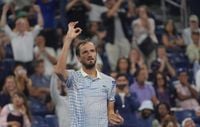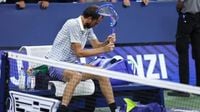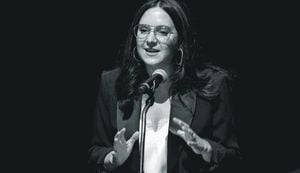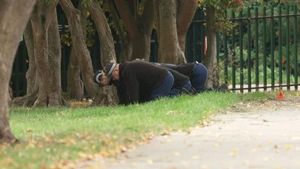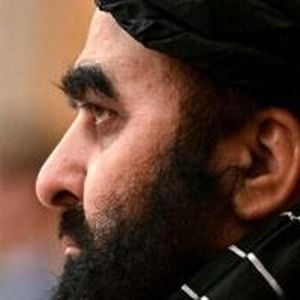The curtain has come down on one of tennis’s most intriguing partnerships. Daniil Medvedev, the mercurial Russian star and former world No. 1, has parted ways with his long-time coach Gilles Cervara after a turbulent first-round exit at the 2025 US Open. The split, announced just days after Medvedev’s controversial defeat in New York, marks the end of an eight-year collaboration that saw the pair reach the pinnacle of the sport—and now, the depths of frustration and public scrutiny.
The drama unfolded on the opening day at Flushing Meadows, where Medvedev faced French qualifier Benjamin Bonzi in a match that would ultimately become infamous for its chaos and emotional outbursts. Medvedev, a three-time US Open finalist and the 2021 champion, was expected to cruise past Bonzi. Instead, the Russian’s temper and nerves unraveled in spectacular fashion, overshadowing the tennis itself and setting the stage for a seismic shift in his career.
The flashpoint came late in the third set, with Bonzi serving on match point. Suddenly, a photographer wandered onto the court, causing a commotion that forced the chair umpire to order a replay of Bonzi’s first serve. Medvedev, already on edge, erupted. He charged at the official, unleashed a tirade into the broadcast camera, and incited the crowd, delaying play for several minutes. According to multiple sources, Medvedev’s meltdown was as much about the moment as it was about a season’s worth of pent-up frustration.
Despite the outburst, Medvedev managed to rally, clawing his way back to win the third and fourth sets and forcing a decider. But his resurgence was short-lived. Bonzi, shaken but not broken, regained his composure and sealed the upset in five sets. As the match slipped away, Medvedev’s anger boiled over once more: he smashed his Tecnifibre racquet to bits, drawing gasps from the crowd and, soon after, the ire of tennis authorities.
The United States Tennis Association wasted little time in handing down punishment. Medvedev was fined a total of $42,500—$30,000 for unsportsmanlike conduct and $12,500 for racquet abuse—amounting to nearly 40 percent of his prize money from the tournament. The penalties, while significant, sparked debate among commentators and former players. Toni Nadal, the respected coach and uncle of Rafael Nadal, weighed in with a stinging rebuke. “Medvedev’s performance was regrettable. He triggered everything, although the audience also played a part, demanding more entertainment than tennis. I am surprised that a player of Daniil’s caliber is unable to control his nerves,” Toni Nadal wrote in his column for El País.
Nadal went further, calling for stricter penalties for racket smashing and disrespectful behavior on court. “The time has come for tennis authorities to consider penalizing players for breaking a racket on court,” he argued. “Tennis players are increasingly unable to control their frustration.” Nadal’s critique touched a nerve in the tennis community, highlighting the growing concern that such outbursts set a poor example for young fans and could tarnish the sport’s image.
For Medvedev, the consequences extended beyond fines and public criticism. The loss to Bonzi marked his third consecutive Grand Slam first-round exit—a stunning fall from grace for a player who, just two years ago, held the world No. 1 ranking and seemed poised to dominate the men’s game. His ATP Live Ranking has now plummeted to No. 16, and with no titles since the 2023 Italian Open, questions abound about his future at the top level.
The split with Cervara was, in many ways, inevitable. The French coach had guided Medvedev through the highs and lows of his career, helping him capture 20 titles—including the 2021 US Open, where Medvedev famously denied Novak Djokovic a calendar Grand Slam—and reach five additional major finals. Their partnership was marked by innovation and trust, with Cervara often credited for harnessing Medvedev’s “unconventional magic as a player,” as he put it in his parting message on Instagram.
“Our fantastic eight-season adventure together comes to an end,” Cervara wrote. “Like a symbolic wink of life, it’s after this US Open tournament that we end our collaboration. I am grateful and happy for all the great things and wonderful experiences we were able to experience together on the court during these eight years. It will remain etched in my memory forever. I thank you for placing your trust in me. I gave EVERYTHING, every second, for our shared goals. I loved training you, coaching you, supporting you (even when it was difficult), and finding solutions with you and the team to help you perform. I will keep in mind your unconventional magic as a player, which is your strength. It will return, I’m sure.”
Medvedev responded with gratitude and nostalgia, sharing a photo of the two celebrating his US Open triumph. “Thank you Gilles. Amazing 8-10 years together, 20 titles, world number 1 but most importantly a lot of fun moments and memories that will stay with us forever. I am grateful to you for guiding me through all these years and let’s see what life brings us in the future.”
The end of the Medvedev-Cervara partnership leaves both men at a crossroads. For Medvedev, the search for a new coach—and a new direction—is urgent. His recent struggles suggest that a change was needed, but the pressure to rebound quickly will be immense. Tennis fans and analysts alike will watch closely to see who joins his team and whether the Russian can rediscover the form that once made him the sport’s most unpredictable and dangerous player.
Meanwhile, the fallout from Medvedev’s US Open meltdown continues to reverberate. The debate over discipline in tennis, fueled by voices like Toni Nadal’s, shows no signs of abating. Will authorities heed the calls for harsher penalties and stricter enforcement? Or will the spectacle of player outbursts remain part of the game’s volatile charm?
One thing is certain: Daniil Medvedev’s story is far from over. With his ranking slipping and his reputation under scrutiny, the next chapter promises to be as compelling—and unpredictable—as any in recent memory. As the dust settles in New York, all eyes turn to Medvedev’s next move, both on and off the court.
